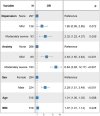Analyzing the correlation between gastroesophageal reflux disease and anxiety and depression based on ordered logistic regression
- PMID: 38503861
- PMCID: PMC10951219
- DOI: 10.1038/s41598-024-57101-2
Analyzing the correlation between gastroesophageal reflux disease and anxiety and depression based on ordered logistic regression
Abstract
Numerous studies have indicated a connection between psychiatric symptoms, specifically anxiety and depression, and gastroesophageal reflux. However, the precise nature of the link between the severity of gastroesophageal reflux disease and the severity of anxiety and depression remains uncertain. Here, we gathered 24-h pH monitoring data and baseline patient information from a cohort of 518 individuals. Additionally, we evaluated their psychological well-being using the Hospital Anxiety and Depression Scale. The relationship between baseline characteristics and varying degrees of anxiety, depression, and gastroesophageal reflux disease (GERD) was assessed using R software version 4.1.3 and logistic regression models. The findings indicate a statistically significant variation in anxiety levels based on gender, as well as a significant disparity in depression groups when considering age and literacy levels. Kruskal-Wallis test analysis revealed a significant positive correlation between the severity of anxiety and depression and the 24-h pH monitoring results in our patient cohort. As the anxiety and depression levels increased, the rank mean for each examination result also increased. Logistic regression modeling analysis showed that a higher anxiety level was associated with a higher level of GERD. In the presence of mild anxiety, there is a statistically significant association with a higher incidence of GERD with an odds ratio (OR) of 2.64 (95% CI 1.50, 4.64). Similarly, the moderately severe anxiety group also exhibits a causal relationship with an increased GERD incidence, with an OR of 6.84 (95% CI 3.92, 12.17). Additionally, moderate to severe depression is associated with a higher incidence of GERD, with an OR of 2.32 (95% CI 1.23, 4.37). The prevalence of GERD was greater among males compared to females (OR 2.29, 95% CI 1.51-3.49). Additionally, an elevated body mass index (BMI) demonstrated a positive correlation with the susceptibility to GERD (OR 1.07, 95% CI 1.01-1.14). Increasing age may promote the occurrence of GERD in patients. These findings may help to provide a better basis for psychological or pharmacological interventions for GERD patients with psychosomatic symptoms in the future, and provide a reference basis for clinical treatment of the disease.
Keywords: 24-h esophageal pH monitoring; Anxiety; Depression; Gastroesophageal reflux disease; HADS.
© 2024. The Author(s).
Conflict of interest statement
The authors declare no competing interests.
Figures
References
-
- Okuyama M, Takaishi O, Nakahara K, Iwakura N, Hasegawa T, Oyama M, Inoue A, Ishizu H, Satoh H, Fujiwara Y. Associations among gastroesophageal reflux disease, psychological stress, and sleep disturbances in Japanese adults. Scand. J. Gastroenterol. 2017;52(1):44–49. doi: 10.1080/00365521.2016.1224383. - DOI - PubMed
MeSH terms
Grants and funding
LinkOut - more resources
Full Text Sources
Medical
Research Materials


